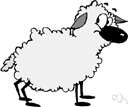ewe
(redirected from Ewes)Also found in: Thesaurus, Medical, Acronyms, Encyclopedia.
Related to Ewes: awes
ewe
a female sheep
Abused, Confused, & Misused Words by Mary Embree Copyright © 2007, 2013 by Mary Embree
E·we
(ā′wā′, ā′vā′)n. pl. Ewe or E·wes
1. A member of a people inhabiting southeast Ghana, southern Togo, and southern Benin.
2. The Gbe language of the Ewe people.
ewe
(yo͞o)n.
A female sheep, especially when full grown.
American Heritage® Dictionary of the English Language, Fifth Edition. Copyright © 2016 by Houghton Mifflin Harcourt Publishing Company. Published by Houghton Mifflin Harcourt Publishing Company. All rights reserved.
ewe
(juː)n
(Animals)
a. a female sheep
b. (as modifier): a ewe lamb.
[Old English ēowu; related to Old Norse ǣr ewe, Old High German ou, Latin ovis sheep, Sanskrit avi]
Ewe
(ˈɛwɛ)npl Ewe or Ewes
1. (Peoples) a member of a Negroid people of W Africa living chiefly in the forests of E Ghana, Togo, and Benin
2. (Languages) the language of this people, belonging to the Kwa branch of the Niger-Congo family
Collins English Dictionary – Complete and Unabridged, 12th Edition 2014 © HarperCollins Publishers 1991, 1994, 1998, 2000, 2003, 2006, 2007, 2009, 2011, 2014
ewe
(yu; Dial. yoʊ)n.
a female sheep, esp. when fully mature.
[before 1000; Middle English; Old English ēowu, ēwe; c. Old High German ou, ouwi, Latin ovis, Greek óïs, oîs]
E•we
(ˈeɪ veɪ, ˈeɪ weɪ)n., pl. -wes, (esp. collectively) -we.
1.
a. a member of an African people of S Togo and SE Ghana.
b. the Kwa language of this people.
2.
a. a member of any of a group of African peoples, including the Ewe and the Fon.
b. the Kwa languages of these peoples.
Random House Kernerman Webster's College Dictionary, © 2010 K Dictionaries Ltd. Copyright 2005, 1997, 1991 by Random House, Inc. All rights reserved.
ThesaurusAntonymsRelated WordsSynonymsLegend:
Switch to new thesaurus
| Noun | 1. | Ewe - a member of a people living in southern Benin and Togo and southeastern Ghana Benin, Dahomey, Republic of Benin - a country on western coast of Africa; formerly under French control Togo, Togolese Republic - a republic on the western coast of Africa on the Gulf of Guinea; formerly under French control Ghana, Gold Coast, Republic of Ghana - a republic in West Africa on the Gulf of Guinea; "Ghana was colonized as the Gold Coast by the British" African - a native or inhabitant of Africa |
| 2. | Ewe - a Kwa language spoken by the Ewe in Ghana and Togo and Benin Kwa - a group of African language in the Niger-Congo group spoken from the Ivory Coast east to Nigeria | |
| 3. |  ewe - female sheep ewe - female sheep sheep - woolly usually horned ruminant mammal related to the goat |
Based on WordNet 3.0, Farlex clipart collection. © 2003-2012 Princeton University, Farlex Inc.
Translations
شاةنَعْجَه، شاةٌ
ovce
får
ŝafino
uuhi
brebiséwé
ovca
anyajuh
ær
雌羊
암양
avis
aita
ooiEwe
ovelhajeje
ovca
tackaewe
แกะตัวเมียที่โตเต็มที่
cừu cái
Collins Spanish Dictionary - Complete and Unabridged 8th Edition 2005 © William Collins Sons & Co. Ltd. 1971, 1988 © HarperCollins Publishers 1992, 1993, 1996, 1997, 2000, 2003, 2005
Collins English/French Electronic Resource. © HarperCollins Publishers 2005
ewe
n → Mutterschaf nt
Collins German Dictionary – Complete and Unabridged 7th Edition 2005. © William Collins Sons & Co. Ltd. 1980 © HarperCollins Publishers 1991, 1997, 1999, 2004, 2005, 2007
Collins Italian Dictionary 1st Edition © HarperCollins Publishers 1995
ewe
(juː) noun a female sheep. The ewe had two lambs.
Kernerman English Multilingual Dictionary © 2006-2013 K Dictionaries Ltd.
ewe
→ شاة ovce får Mutterschaf προβατίνα oveja, oveja hembra uuhi brebis ovca pecora 雌羊 암양 ooi søye strach ovelha овца tacka แกะตัวเมียที่โตเต็มที่ koyun cừu cái 母羊Multilingual Translator © HarperCollins Publishers 2009